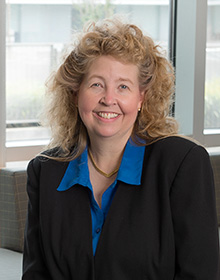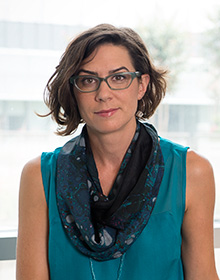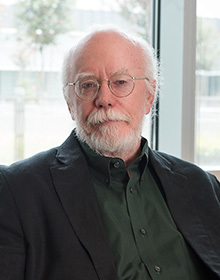Faculty reputations draw students
UNT's students drive what top faculty members do
September 28, 2015
 Michael Jones came to UNT to study for his doctorate under one of the best computational chemists
in the world.
Michael Jones came to UNT to study for his doctorate under one of the best computational chemists
in the world.
He sought a professor with a strong reputation who also would be a good mentor and teacher.
He found all of that in Angela Wilson, Regents Professor of chemistry.
"Dr. Wilson is a recognized leader in our field around the world," Jones says. "When I go somewhere and I mention my advisor's name, they say, 'Oh, I know her.' That opens up a lot of opportunities for her students."
Wilson will receive the 2015 UNT Foundation Eminent Faculty Award at the Salute to Faculty Excellence dinner, 6:30 p.m. Oct. 2 at Apogee Stadium. At the dinner, the UNT Foundation also will recognize:
- Outstanding Lecturer Award -- Lesli Robertson, principal lecturer of studio art
- Faculty Community Service Award -- Donna Emmanuel, associate professor of music education
- Faculty Leadership Award -- David Mason, Regents Professor of political science
The event honors 26 faculty members who use their expertise to offer students opportunities in dozens of fields.
Strong reputation
Wilson has stood out in the sciences internationally, and her list of accolades is long.
In 2012, International Innovation magazine featured her in its "Trailblazer in North American Research" issue. In 2013, she was one of two U.S. scientists named a Distinguished Woman in Chemistry and Chemical Engineering by the International Union of Pure and Applied Chemistry.
She won the 2015 Garvan-Olin Medal, one of the most prestigious awards in chemistry.
Wilson also is a fellow of the American Association for the Advancement of Science, the American Physical Society and the American Chemical Society.
She investigates molecular pathways that could trigger cancer, alternative energy, carbon dioxide sequestration and more. She also studies lanthanides or "rare earth elements" that are important components of cell phones, smart cars and many other technological devices.
Wilson founded the UNT Center for Advanced Scientific Computing and Modeling, which includes nearly 100 faculty members, post-doctoral fellows, staff members and students.
Down to earth
Jones says Wilson is more than a good chemist; she also is a good teacher.
"Some scientists are hard to approach, hard to have conversations with, but not her," Jones says. "She is down to earth, understanding and approachable. She is inspirational to work with. And she is a nurturing teacher and mentor. She is the type of teacher who goes the extra mile to help her students."
Wilson says 20 to 30 students and post-doctoral fellows conduct research in the CASCAM lab each year. Seeing them succeed makes her work rewarding.
"I challenge my students to be creative and innovative because I want them to succeed and do their best in whatever career field they choose," she says. "I expect a lot out of my students, but I also try to offer a lot of support outside of the classroom when they need help."
Finley Graves, provost and vice president for academic affairs, says students who attend UNT receive a top-notch education because of the excellent faculty members.
"Outstanding professors, like Wilson, create a legacy of quality teaching and research," Graves says. "The graduate students she advises adopt her high standards and pass those on to future generations of chemists. Likewise, her work with undergraduate researchers prepares them to go to the top, whether it's in academia or industry."
While that lab has provided multiple opportunities for students in the sciences, faculty members in the arts and humanities also give their expertise to help students thrive.
Opportunities in art
 Robertson, a principal lecturer of studio art, brings a creative spark to her work and students thanks to her expertise in installation
artwork, community engagement, weaving, and Ugandan cultural arts. She recently led
workshops exploring new weaving patterns based on traditional patterns found in Bedouin
culture as a Fulbright Specialist in Kuwait and as a College of Visual Arts and Design
faculty member who teaches advanced weaving students.
Robertson, a principal lecturer of studio art, brings a creative spark to her work and students thanks to her expertise in installation
artwork, community engagement, weaving, and Ugandan cultural arts. She recently led
workshops exploring new weaving patterns based on traditional patterns found in Bedouin
culture as a Fulbright Specialist in Kuwait and as a College of Visual Arts and Design
faculty member who teaches advanced weaving students.
"One of the most rewarding parts to my job is to see students grow as they go through the program," Robertson says. "It is wonderful when you can help them find their strengths, work to develop them, and watch as they make their way from your classroom into the world."
In addition to her work in Kuwait, Robertson has studied the culture of East Africa, focusing on bark cloth from Uganda. Her works include The Mother Load, a project done in collaboration with artist Natalie Macellaio ('05) and that addresses what it is to be both artist and mother. Robertson's renowned works have earned her grants from the Dallas Museum of Art, the Surface Design Association, the Textile Society of America, and she has received a faculty fellowship with the UNT Institute for the Advancement of the Arts in support of her artwork and research.
"My research and professional work … allows me to connect students to people, places, and ideas that are important in our field," she says. "Hopefully this will allow them to realize what is possible with their degree."
Engaging students with music
 Emmanuel teaches undergraduate and graduate courses in music education, founded and
sponsors UNT's Mariachi Águilas and organizes a summer mariachi camp for middle school and high school students.
The summer camp has bridged many gaps with the Mexican-American community by providing
opportunities for youth and by showing them that going to college is not an impossible
dream for them.
Emmanuel teaches undergraduate and graduate courses in music education, founded and
sponsors UNT's Mariachi Águilas and organizes a summer mariachi camp for middle school and high school students.
The summer camp has bridged many gaps with the Mexican-American community by providing
opportunities for youth and by showing them that going to college is not an impossible
dream for them.
Emmanuel says her own background inspires her to make every effort to help children's dreams come true. She grew up in poverty in the mountains of southern Virginia, and understands what it is like to be faced with challenges and to be viewed as an outsider.
"I have a resonance with people who struggle, because I know what that's like," she says. Mariachi camp has allowed the participants to build mentoring relationships with Mexican-American UNT students who are being successful in college. Mentoring occurs at multiple levels, and is grounded in the theory of Positive Youth Development. Campers stay in the dorms, eat in the cafeterias, and see that a university experience is accessible to them. As a result, 30 to 40 students who attended the camp have enrolled at UNT, most being the first in their families to attend college.
The 12-year-old Mariachi Águilas draws students from across the University, and performs for many events in the community, both on and off campus. Members of the ensemble learn about the cultural significance of mariachi from their current director, José Torres, a doctoral student in ethnomusicology. This ensures their performances for the Mexican American community are authentic, and therefore highly valued.
Emmanuel also serves as the chair of the College Music Society's national committee on community engagement. The committee works to bring new perspectives to the ways community members might engage with one another musically, encouraging dialogue and co-creation of projects and events based on what would be beneficial for all.
Working for world peace
 Mason is the Johnie Christian Family Peace Professor, Regents Professor of political
science, and director of UNT's undergraduate peace studies program.
Mason is the Johnie Christian Family Peace Professor, Regents Professor of political
science, and director of UNT's undergraduate peace studies program.
When he arrived in 2002, UNT already had an internationally recognized collection of scholars in the field of human security research. His goal was to make that strength a permanent one by building a human security research institute to give scholars a reason to come to UNT and to stay here.
In 2004, Mason received a U.S. Department of Education grant to enhance UNT's Peace Studies curriculum and add an Arabic language minor.
In 2009, Mason was part of a team that launched the Castleberry Peace Institute, named for journalist Vivian Castleberry.
"One thing that brings a sense of UNT pride is seeing an article by one of our Ph.D. graduates in a major scholarly journal, and seeing other scholars cite the works of our students," Mason says.
UNT's graduate programs in human security are among the best in the country, he says, and the Institute, now led by James Meernik, will continue to provide opportunities for students for years.
"We want to make UNT a destination point for scholars and students interested in human security and peace science research," Mason says. "Through the cutting-edge scholarship and committed collaboration of our excellent faculty, we are well on our way to achieving that goal."
Watch a video with Angela Wilson, UNT Foundation Eminent Faculty Award Winner.